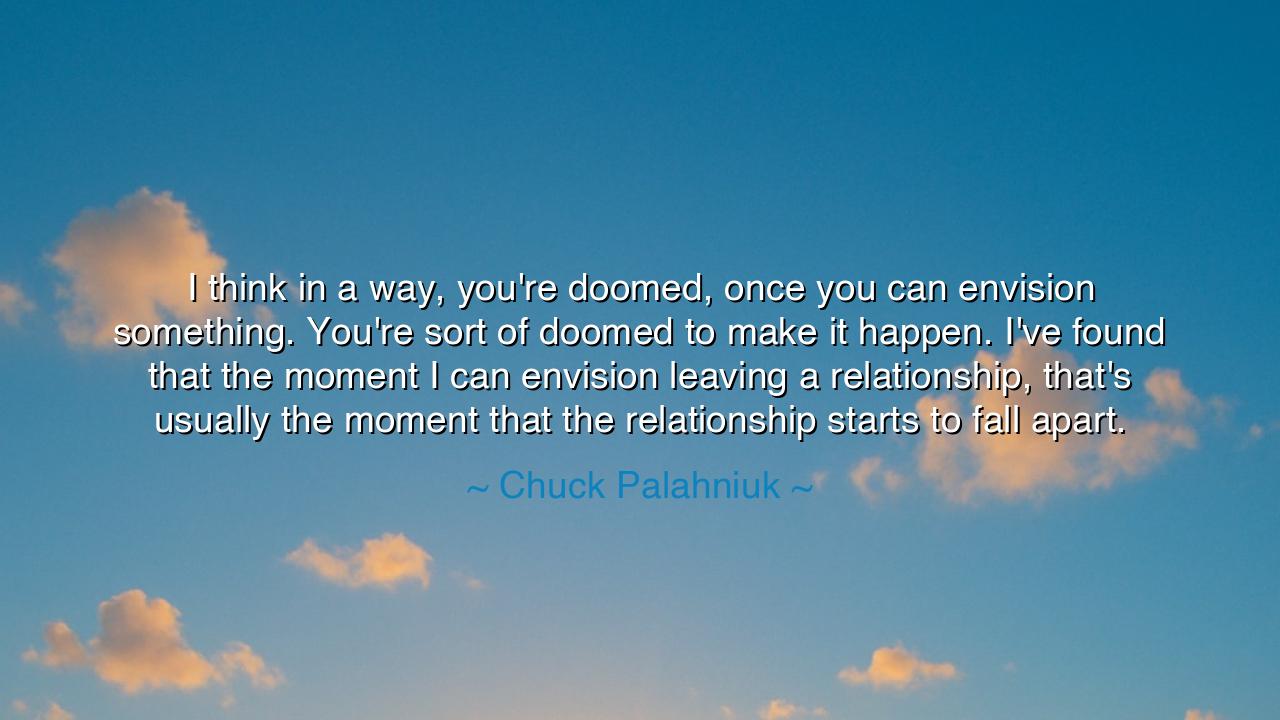
I think in a way, you're doomed, once you can envision
I think in a way, you're doomed, once you can envision something. You're sort of doomed to make it happen. I've found that the moment I can envision leaving a relationship, that's usually the moment that the relationship starts to fall apart.






When Chuck Palahniuk confesses, “I think in a way, you’re doomed, once you can envision something. You’re sort of doomed to make it happen. I’ve found that the moment I can envision leaving a relationship, that’s usually the moment that the relationship starts to fall apart,” he speaks with the gravity of one who has wrestled with the mysterious power of thought. His words reveal the ancient truth that what the mind dares to imagine, the spirit begins to shape into reality. The seed of vision, once planted, cannot remain idle; it grows, even if it grows toward destruction.
The origin of this wisdom lies in the restless nature of the human heart. To envision is not a harmless act, for imagination carries the power of prophecy. When the mind first beholds the possibility of departure, it loosens the threads that bind, and the relationship begins to unravel. Palahniuk’s reflection reminds us that every end begins in the realm of thought, long before the body departs or the word of farewell is spoken.
To be doomed by one’s own vision is to recognize that consciousness itself is creative. Just as hope can summon courage, doubt can summon decay. Thus, when one imagines the death of a relationship, the heart, perhaps unknowingly, begins to withdraw, and the sacred bond weakens. This is the silent law of the soul: that thought guides action, and what is continually envisioned soon takes form.
Yet his words are not mere lament but warning. They teach that the act of envisioning carries responsibility. If one constantly imagines failure, betrayal, or departure, then the spirit aligns with ruin. But if one chooses to envision reconciliation, strength, and renewal, the same law applies, and life itself bends toward restoration. The vision we hold is the future we invite.
Let the generations to come remember: the mind is both seed and soil, and every image it entertains has power. Palahniuk’s words endure as testimony that our relationships, like our lives, are shaped first by imagination. Guard your visions carefully, for in them lies the destiny of both union and dissolution.






Hhuyen
Palahniuk’s words make me wonder if envisioning an end is the first sign of a relationship’s death. Can the mere thought of leaving actually trigger the unraveling of something that might have otherwise been saved? It’s an interesting concept: that our minds may start to detach before our actions do. Does this mean our subconscious plays a bigger role in how we handle relationships than we care to admit?
PNPhuongAnh Nguyen
I find Chuck Palahniuk's quote about relationships to be incredibly relatable, but also unsettling. Is it true that once we can picture leaving, the relationship begins to crumble? I’ve often noticed that when I start imagining a life without someone, the relationship becomes strained. But does this idea of being 'doomed' come from a lack of effort, or is it a sign that deep down, we know it's already falling apart?
NLTran Nhat Long
Palahniuk’s insight into relationships suggests that the moment you can imagine leaving is the moment the relationship begins to unravel. Is this an automatic consequence of our thoughts, or is it more about realizing that things have already changed in our hearts? Could this be a warning about the power of envisioning an alternative reality, or is it just a reflection of the human tendency to lose hope once we start considering other options?
Tthiencb
This quote by Chuck Palahniuk seems to imply that once we entertain the idea of leaving something behind, the decision is already made. But is that really how it works? Do our thoughts have that kind of power, or is it more about recognizing a shift in feelings that leads to the mental vision of departure? It’s interesting to think that simply imagining the end could be the first step toward making it a reality.
TLTran Long
Palahniuk’s perspective on envisioning change is both chilling and enlightening. Could it be that once we start mentally planning an escape, it’s already too late? Is this about the power of our thoughts shaping reality? When we envision a future without something, does it create an inevitable path to that end? This quote really makes me wonder how often our thoughts truly precede our actions in relationships, work, or even life decisions.